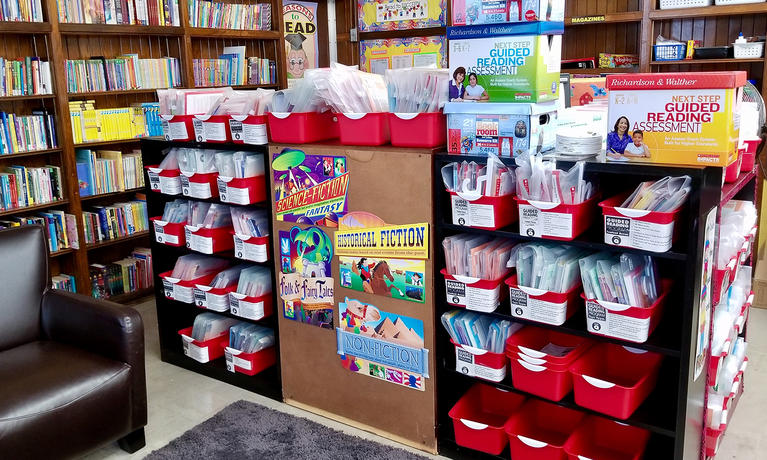
Where there were once empty bookcases against the wall, there are now thousands of reading materials for children to peruse and choose.
Beginning this school year, Bennett Elementary School Library—which had been closed for more than a decade—is filled with children sitting on rugs and at tables, flipping through the pages of their selected books.
J.K. Rowling’s Harry Potter. Gary Soto’s Too Many Tamales. Eloise Greenfield’s Grandpa’s Face. And Beverly Cleary’s Henry Huggins, a personal favorite of Paul Bielich, College of Education, Health, and Human Services (CEHHS) instructional learning manager.
“When I was young, that book inspired me to love reading. That made a major impact on my life,” Bielich said. “It is so important for children to have access to books. If they have no books, how can they develop a love for reading?”
Bielich said the lack of a proper library was brought to the university’s attention by members of the Detroit-based nonprofit Southwest Solutions, a UM-Dearborn community partner in the school’s neighborhood. And a group of CEHHS educators collaborated with Kaity Nicarsti, Southwest Solutions Community Schools site coordinator.
Reading, Language Arts and English as a Second Language Associate Professor Martha Adler, Reading and Language Arts Associate Professor Danielle DeFauw and Bielich helped to reinvigorate the space at Bennett, a learning environment for more than 500 pre-kindergarten to fifth grade students.

For more than a year, CEHHS worked with Detroit Public Schools employees to put a reading space back into the building. The project received a nearly $4,500 grant from the Office of Metropolitan Impact and in-kind support from several publishers, with Scholastic giving the largest donation.
“There is a joy that you can feel now that it is open again and I’m glad I can share in that,” Bielich said. “I was born and raised in Detroit. I went through city schools. I worked as a DPS librarian for 36 years. It is in my heart.”
Even with the library open, there still is work to do. Bielich is currently creating a circulation system for the children to check the books out. To help with this, approximately 20 UM-Dearborn students, who are members of Books for a Benefit, come to the library weekly to inventory books in need of cataloging.
The team feels the most important aspect of this work will go beyond the bookshelf. Research shows that children with regular access to a library perform better in school as a whole.
Results from dozens of large-scale studies—involving over 8,700 schools and over 2.6 million students— have consistently demonstrated that students score an average of 10 to 20 percent higher on reading and achievement tests when their school has a strong library media program, according to an August 2013 School Library Impact Studies Research Summary. And this effect holds regardless of other school conditions such as student-teacher ratio, overall per-pupil spending, student demographics and community socio-economic conditions.
“Studies have shown that student achievement rises when there are these resources for students, libraries in particular,” he said. “A book can take you anywhere.”




